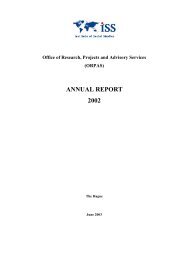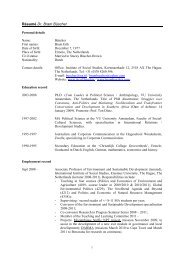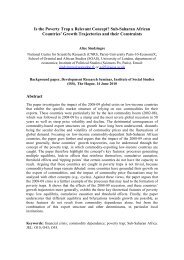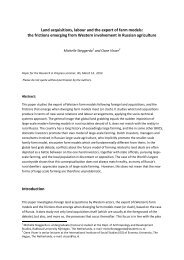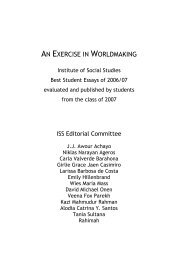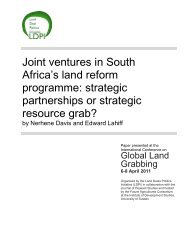AN EXERCISE IN WORLDMAKING 2009 - ISS
AN EXERCISE IN WORLDMAKING 2009 - ISS
AN EXERCISE IN WORLDMAKING 2009 - ISS
Create successful ePaper yourself
Turn your PDF publications into a flip-book with our unique Google optimized e-Paper software.
6 The Utility of the Citizen: Relating Citizenship in Social Movement Activity 65<br />
egalitarian, horizontal and solidarian structures seeking to disable or<br />
question unequal power relations. Therefore, citizenship is a crucial concept<br />
and tool for them to claim and realize equality or rights against such<br />
power relations.<br />
While there are inevitably impositions to concepts dictated by overarching<br />
social and structural power relations, the potential of citizenship<br />
remains as a useful tool for actors such as social movements who seek to<br />
mobilize on the basis of common concerns, mutual interests, identification<br />
and grievances. Social movements often seek to reveal issues not<br />
necessarily considered problematic within mainstream politics or media,<br />
attempting to shine light on frequently ignored spheres of influence and<br />
conflict. This can also be referred to as a political strategy whereby the<br />
concept of citizenship is a tool contesting the right of a collective and<br />
the individual held within it to possess rights and express them. As argued<br />
by Dagnino, social movements actually inject new forms of citizenship<br />
on the basis of their grievances, redefining the very idea of rights.<br />
These rights may not even be linked to dominant classes or the state for<br />
their incorporation and transcend the liberal perception for inclusion,<br />
membership and belonging to a given political system. Rather, a movement’s<br />
imagination of citizenship is the right to participate in the very<br />
definition of a system, economic, political, legal or otherwise, and to define<br />
what type of structure they wish to be members of (Dagnino 1998:<br />
51). Therefore, citizenship is a multidisciplinary concept related to socioeconomic,<br />
political, legal and cultural arenas serving as a tool upon which<br />
social movements can engage public and private action around a potentially<br />
new kind of inclusion (Hickey and Mohan 2004: 70). Not all social<br />
movements may envision such a radical reorganization of politics and<br />
society; however, the sustainability of social movements themselves still<br />
depends quite distinctly on citizenship not merely as a concept, but also<br />
as a tool for their mobilization and action-oriented activities.<br />
POLITICAL ARENAS<br />
Citizenship is now recognized not only in relation to its legal and political<br />
considerations, but encompasses a pluralist understanding, acknowledging<br />
ideas of inclusivity, participation, culture, etc. Social movements<br />
are able to envision a new form of political engagement enshrined by<br />
democratic principles that accounts for this diversity. With citizenship as<br />
a reference point, social movements are able to operationalize democracy




